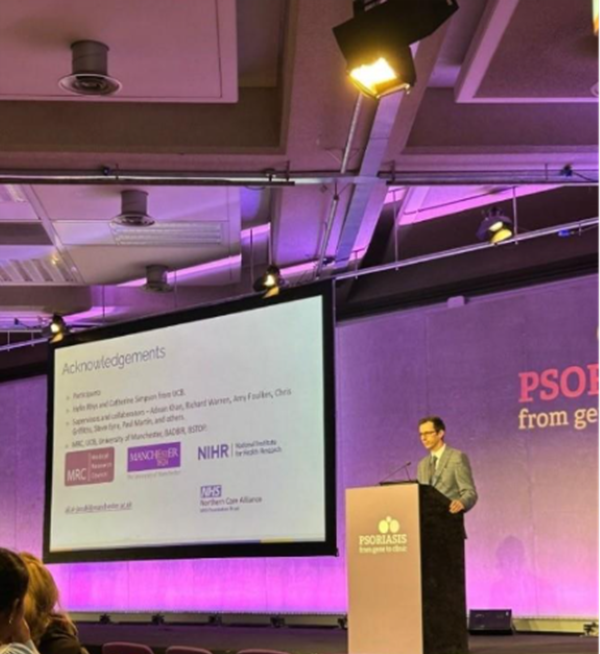Innovator Insights blog: Advancing dermatology research through industry partnerships with Dr Ali Al-Janabi
Welcome to our Innovator Insights blog series where we invite pioneering National Institute for Health and Care Research (NIHR) Manchester Biomedical Research Centre (BRC) researchers to share their personal innovation journey, how they have developed impactful research alongside industry and commercial partners and the lessons they learnt along the way.
In this blog Dr Ali Al-Janabi discusses how early-career collaboration with industry, particularly during his PhD on immune mechanisms in inflammatory skin diseases including paradoxical eczema, advanced his research, fostered translational impact, and shaped his future direction in personalised medicine for inflammatory skin diseases.
I am a National Institute for Health and Care Research (NIHR) Clinical Lecturer working in the Division of Musculoskeletal and Dermatological Sciences at The University of Manchester.
My work is supported by NIHR Manchester Biomedical Research Centre (BRC) infrastructure. Here, I have been identified as a “Rising Star” (an early career researcher and potential future leader in biomedical research) and regularly contribute to Dermatology Theme meetings where research updates, impact, public and patient involvement and other aspects of research management are discussed.
I obtained my medical degree from the University of Cambridge in 2014 and completed my early medical training in the East of England.

I moved to Manchester as an Academic Clinical Fellow in Dermatology in 2018, where my research was supervised by Professor Richard Warren, Dermatology Co-Theme Lead at Manchester BRC. I obtained a PhD fellowship as part of the North West Medical Research Council (MRC) Clinical Pharmacology and Therapeutics Fellowship Scheme and completed my PhD at The University of Manchester in 2023.
Collaborating with industry during PhD
My clinical and research interests relate to inflammatory skin diseases and advanced therapeutics. Dermatology has benefited from a rapid increase in the number of available targeted therapies for diseases like psoriasis and atopic dermatitis. Work in this area naturally benefits from collaboration between academia and pharmaceutical companies due to shared interests in understanding treatment response and improving patient outcomes.
Collaborating with industry provides a fantastic opportunity to access expertise, funding and translate research into real-world impact. For example, collaborative research might demonstrate how safe and effective medicines are in diverse population groups outside of clinical trials, or whether there are patient groups who respond differently to specific treatments.

Part of my PhD scheme involved collaborating with an industry partner from the very beginning, in co-developing the research proposal. I partnered with UCB, a global pharmaceutical company, and together with my supervisors we developed a programme of work to understand the mechanisms of paradoxical eczema, an adverse event which develops in some psoriasis patients receiving monoclonal antibody therapies which target specific immune pathways (biologics).
I maintained regular contact with my industry supervisor and undertook a placement at UCB’s UK research facility. I completed laboratory experiments, specifically using mass cytometry (a technique used to define the types and functions of cells) on white blood cells obtained from participants during my PhD.
Working with industry during my PhD undoubtedly resulted in the success of my studies. My mass cytometry experiment would not have been possible without the practical support and expertise of the scientists at UCB, and this study was important to understand the immune changes occurring in patients with paradoxical eczema. This work has since been presented at an international meeting (Psoriasis: From Gene to Clinic 2024) and published in the Journal of Investigative Dermatology.
Industry collaboration guided my academic development, particularly regarding bioinformatics analysis and laboratory techniques, and I have since been approached by industry to support clinical trials as a site principal investigator.
Top Tips for industry-academic collaboration
- Start contract negotiations early and seek institutional support: The process for contracting can often take a long time, especially if there are multiple partners involved. Start this process as early as possible and ensure that contracts clearly define ownership and sharing processes for biological samples, information and arising intellectual property. If you’re unsure what freedoms you operate on, seek advice from your university’s contracts team for guidance.
- Be mindful of potential conflicts of interest: Working across multiple organisations it is important to understand how conflicts of interest may interact with your various pursuits. Be mindful of how collaborations with industry may introduce new conflicts, especially in relation to other academic responsibilities, and manage these carefully to maintain integrity.
- Leverage professional bodies for support: Engage with relevant professional associations in clinical and non-clinical settings to help navigate conflicts of interest and new processes.
- Sharing expertise: There is great merit in combining efforts across academia and industry to achieve shared research goals, in particular for areas such as methodology. Ensure you make the most of your partnerships to gain the best outcomes.
Next steps
In my future career researching inflammatory skin diseases, I will reach out to industry where this could enhance or accelerate translational and clinical research. For example, I am keen to understand whether there are clinical or biological factors which can predict treatment outcomes or adverse events in patients with psoriasis or atopic dermatitis.
Having been in contact with several potential industry collaborators, I have learned that personalised medicine is a shared area of interest between academia and industry, and I look forward to seeing how this field develops and influences clinical practice for the benefit of patients.
Advice for researchers wanting to work with industry
My main points of advice are:
- Think carefully about the research question, and how collaborating with industry would enhance the research.
- Approach industry partners whose interest aligns with your research.
- Conceptually simple and impactful ideas are often best-received.
- Speak to others who have collaborated with industry, particularly the same companies you might approach.
- Consider how conflicts of interest resulting from collaboration or commercialisation could impact other academic pursuits.
For more information or to discuss collaboration opportunities, please complete the NIHR Manchester BRC Industry Enquiry Form or get in touch with the BRC Innovation and Partnerships team by emailing brc-crfpartnerships@mft.nhs.uk .
Read more blogs in our Innovator Insights series.
Follow Manchester BRC on X/Twitter and LinkedIn to keep updated with the series.
